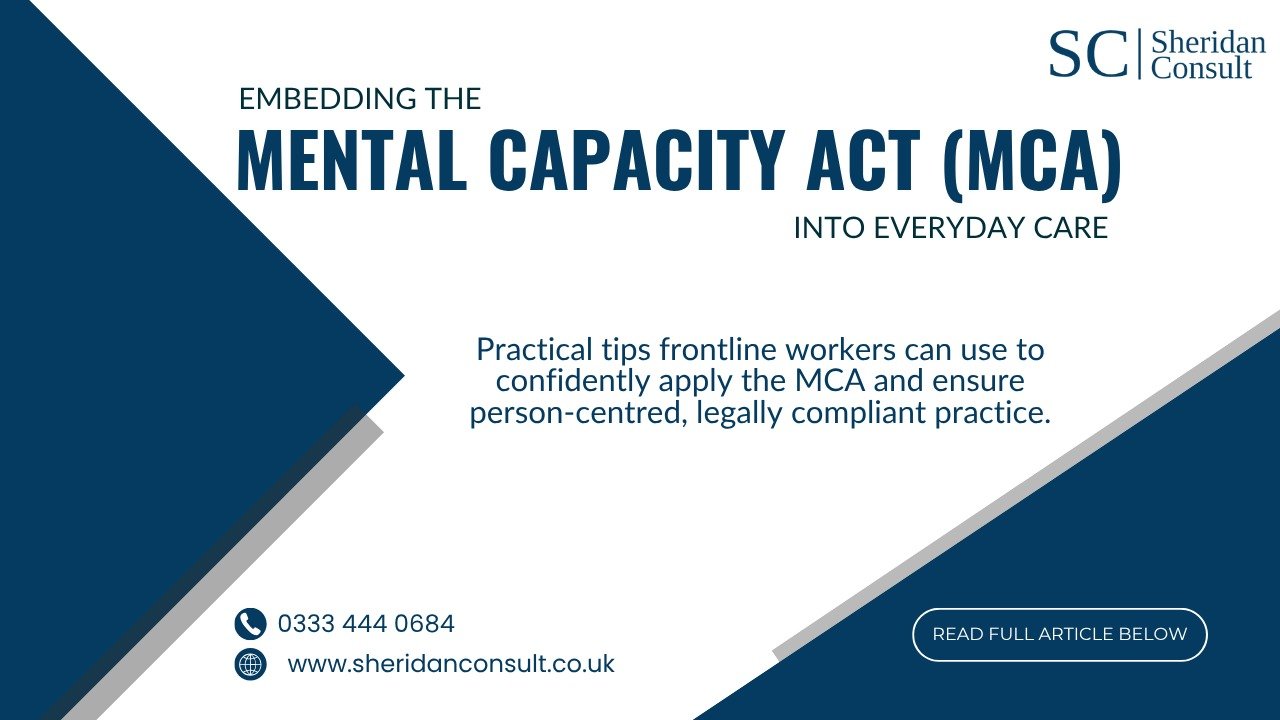Embedding the Mental Capacity Act in Everyday Practice: Tips for Frontline Workers
Date: 30th September 2025
Authored By: Doris Sheridan | doris@sheridanconsult.co.uk
The Mental Capacity Act (MCA) 2005 remains a cornerstone of health and social care practice in England and Wales. Designed to protect and empower individuals who may lack the capacity to make certain decisions, the MCA sets out clear principles that frontline workers are expected to embed into daily practice. Yet, despite its importance, many practitioners find themselves uncertain about how to apply the Act consistently in real-world scenarios.
At Sheridan Consult, we know that embedding the MCA effectively requires more than theoretical knowledge, it demands practical application, reflective practice, and confidence in decision-making. Below are some key considerations and practical tips for frontline staff.
Tips for Frontline Workers
1. Keep the Five Core Principles Front and Centre
The MCA is built on five guiding principles, from presuming capacity unless proven otherwise, to ensuring that any action taken is in the person’s best interests. These should not be seen as abstract legal statements but as practical checks to guide everyday decision-making. Regularly revisiting these principles during supervision or team discussions can help staff to embed them as part of routine care.
2. Prioritise Communication and Creative Approaches
Capacity assessments hinge on how information is shared and understood. Using simple language, visual aids, or alternative communication methods can make a significant difference. Frontline workers should feel empowered to adapt their communication style to meet individual needs, ensuring that capacity is maximised before concluding someone cannot decide for themselves.
3. Best Interests Is Not Just a Process, It’s a Mindset
When a person is assessed as lacking capacity, decisions must be made in their best interests. This goes beyond ticking a form; it involves balancing medical, emotional, and social factors, alongside the individual’s past and present wishes. Including families, advocates, or those who know the person best ensures decisions remain person-centred and defensible.
4. Document with Clarity and Confidence
Good record-keeping is vital under the MCA. Clearly document the reasoning behind a capacity assessment, the steps taken to support decision-making, and how best interests decisions were reached. Strong documentation not only demonstrates compliance but also provides reassurance for staff and protection for the individual.
5. Invest in Continuous Learning and Reflective Practice
The MCA is complex, and applying it consistently requires ongoing training and reflection. Embedding case discussions, reflective practice sessions, and peer learning opportunities can support staff to build confidence and refine their judgement in line with the Act.
Embedding the MCA in daily practice is not about adding more paperwork or creating additional barriers. It is about ensuring dignity, autonomy, and protection for those we support. For frontline workers, confidence comes from understanding the principles, applying them thoughtfully, and being supported by robust organisational frameworks.
At Sheridan Consult, we work with providers to strengthen MCA practice through tailored training, case reviews, and audit support. By embedding the Act into everyday culture, organisations can ensure their teams deliver care that is not only compliant but truly person-centred.
If your organisation is looking to enhance MCA practice and empower your frontline teams, our consultants would be delighted to support you.




